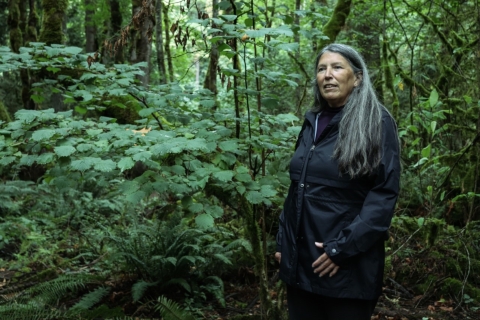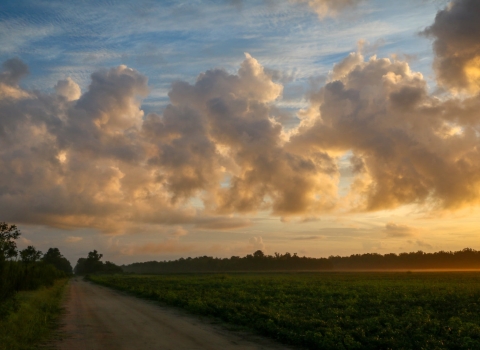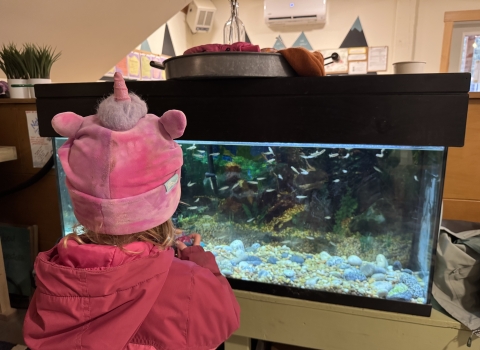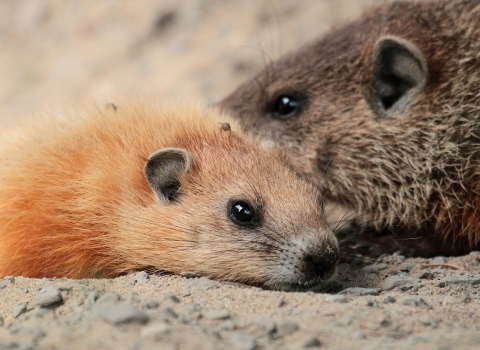Judy Bluehorse Skelton, Nez Perce/Cherokee, has dedicated her career to passing on Indigenous traditional ecological and cultural knowledge (ITECK) and educating the public about Native American history in the Pacific Northwest. Skelton is also an assistant professor of Indigenous Nations Studies at Portland State University (PSU), and a community leader.
Her courses and work integrate land management practices with ITECK to address the disruption of food intake or eating patterns because of lack of money and other resources, and reclaim the urban forest for physical, mental, emotional and spiritual health. Ultimately, Skelton assists students and Indigenous community members who want to reconnect with the natural world and find a sense of belonging within the urban space.
Skelton’s work with local governments and other Portland area groups led to her involvement in creating a unique space for teaching and practicing ITECK within the city. In order to appreciate why using ITECK and one’s connection to the land is so important, however, we must first look at history.
In 1956, the U.S. Congress passed the Indian Relocation Act. This bill incentivized Native Americans to move from their traditional or reservation lands and relocate to urban centers. In doing so, however, the bill effectively helped to sever Tribal and cultural ties as these groups assimilated with the urban white population and lost access to nature. Major cities in the West, including Seattle, Los Angeles, Denver and Portland, were selected for resettlement. When the relocation program began, U.S. Census data indicated that approximately 8% of Native Americans lived in cities. By 2000, this number had risen to 64%.
Today, Portland is home to thousands of Indigenous people, some of whom were relocated, and others who are the descendants of displaced relatives. Many others live on their ancestral lands but no longer have access to nature as urban sprawl and development have reduced green space. The result for many is the same –there is little room to cultivate first foods and medicines and to conduct ceremonies within the city. This loss of access has disrupted traditional practices and has had a widespread impact on the urban Indigenous community living in Portland. For many, there is a profound desire to reconnect with the land.
In 2011, a group of partners, including indigenous community leaders, Portland Parks, Verde, the U.S. Fish and Wildlife Service’s Portland-Vancouver Urban Refuge program, and others wanted to find a way to give Portland residents access to green space within the urban jungle. A landfill, formerly known as the Killingsworth Fast Disposal Landfill, went into disuse in 1990 and was taken over by the Oregon Department of Environmental Quality. Located in an industrialized part of the city just south of the airport, the neighborhood surrounding the landfill was in desperate need of areas to recreate, rejuvenate, and enjoy the outdoors. In 2002, Portland Parks purchased the land with the hope of reclaiming the landfill, restoring the land, and creating a park.
In addition to offering outdoor recreational opportunities for local residents, the newly named Cully Park would provide Native Americans a place to conduct traditional practices and ceremonies in a Native Gathering Garden. This designated space would give visitors the chance to reconnect to a lost resource and heal decades, even centuries of historic trauma. Overwhelming need and public support for the idea, coupled with the planning and involvement of Skelton and other Indigenous leaders, allowed the project to take shape and become a reality.
After seven years of planning, design, and construction, Cully Park opened to the public in 2018, boasting 25 acres of greenspace, playgrounds, picnic tables and a Native Gathering Garden to support the cultural needs of the more than 300 Indigenous Tribes represented in Portland. Cully Park’s Native Gathering Garden is the first in the region and serves an important cultural and therapeutic function for the community.
The garden itself began as a half-acre plot and has since expanded to a six-acre sanctuary. Users can plant first foods such as serviceberries, chokecherries, currants, thimbleberries, and more than 30 other species, while practicing traditional cultivation methods. Skelton brings her students to Cully Park to teach plant identification, conduct Indigenous land management practices, and restore the land. This hands-on component of her class is among the most popular and most valuable educational experience for her students.
“The process of healing the land and spreading ITECK to students is more than just growing plants,” says Skelton. “For many Indigenous people, native plants are relatives and teachers, as well as necessary for survival. Water is sacred. Animals are kin. The natural world is family. And by healing this family, by repairing damage and reconnecting with these relatives, participants have felt a renewed sense of hope and belonging that had been forgotten.”
At PSU, some urban Indigenous students found a home within the program and regained a foothold within their community. With the addition of Skelton’s program, the university began to see higher Native American student retention rates and dozens changed their majors to focus on Native American studies. This has sparked the development of a new certificate in ITECK at PSU, and the growing support for the program is reflective of the need for this type of educational opportunity within Portland.
The U.S. Fish and Wildlife Service has been an active partner and supporter of Skelton’s mission since 2013. The Service — both nationally and locally — has stressed the need to connect with local communities. The Department of Interior and the Service prioritize the advancement of racial equity by providing wildlife-related education and recreation opportunities to underserved communities, particularly in urban areas. By investing in Cully Park’s Native Gathering Garden, the Portland-Vancouver Urban Refuge Program sought to build relationships with neighbors, support urban restoration projects that improve water quality and wildlife habitat, and unite people from all walks of life over a shared love of the outdoors.
For Skelton and other partners, the garden has become a successful collaborative effort resulting in an important cultural site for Portland’s urban Indigenous community. Since its opening, hundreds have visited the garden to work the land, restore habitat, and benefit from physical, emotional, and spiritual access to natural resources.
Today, that relationship continues. Skelton, the Service, and others have planned salmon celebrations, provided internships and other support for PSU’s emerging Indigenous student leaders, and collaborated on educational events. This dedicated group of community leaders continues to work together to spread awareness about the importance of ITECK at the Native Gathering Garden, at national wildlife refuges, in neighborhood parks, on campus, and beyond.







